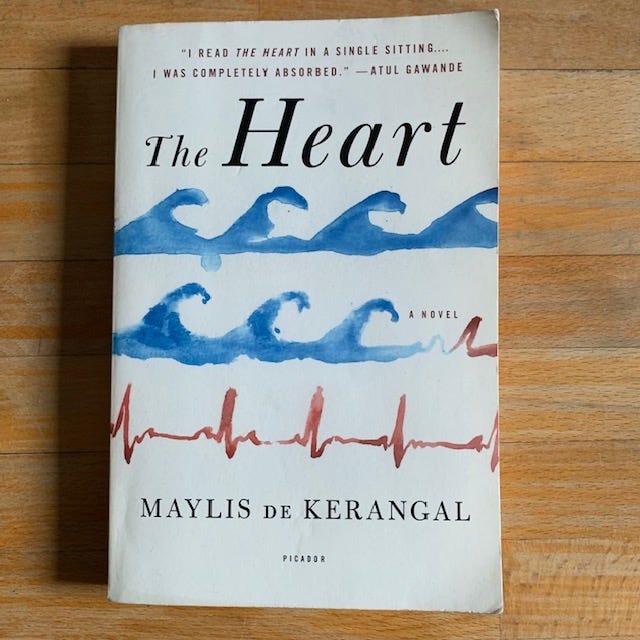
Before we begin the final review of 2019, I just want to take a moment to thank you all for supporting Books on GIF. This little newsletter continues to grow (20 percent above my subscriber goal this year!) because of readers like you who want to find new and different voices in the book world. Thank you for subscribing! Thank you for telling a friend about BoG! Thank you for following me on social media! Thank you for your positive energy and feedback!

Have you ever been on a quest to find a book, plumbing the depths of used bookstores until you find it? For reasons I don’t remember, I spent the past few years on the hunt for this Sunday’s selection, ‘The Heart’ by Maylis de Kerangal:

I found it recently while wandering the back-most aisle at the Strand, and I was super excited to fulfill my quest and to review it. But then I started to read it, and I was like:

This was not what I had expected. But I couldn’t remember what I expected or where I had first heard of this novel, or why I wanted to read it so badly. I fell asleep a lot, to be honest. Maybe it was the stress of the holidays. Maybe it was year-end fatigue. Either way, I had to force myself to finish this book in time for today’s newsletter. ‘The Heart’ tells the story of the death of Simon Limbres, a vibrant teenage surfer in France who’s killed in a car crash (he wasn’t wearing a seatbelt), and how his organs will be harvested so others may live. De Kerangal employs a unique and interesting way of telling a story. There’s really no central protagonist. Rather, the specter of death, and the myriad events and reactions it sets in motion, form the through-line of the narrative. We briefly meet Simon before he goes through the windshield. The story turns to focus on his grieving parents, and then the doctors and nurses who attend to them and to Simon’s body, before moving on to more doctors who will perform the organ removals and transplants, and finally the woman who will receive Simon’s heart. Along the way, we get snippets of each character’s backstory (one doctor, for example, is an accomplished singer and goes on a side quest to purchase a goldfinch in Algeria) as well as a primer on their function in the medical world (I had no idea all the steps and people involved in organ donation). As a reader, I felt as if I were a ghost who happened to be floating through the hospital while this story is happening, pausing briefly to watch this person or that and examine their lives unbound from the continuity of time, like:

I was going to say this is a good book to read if you’re thinking of becoming an organ donor. But then again, maybe not. Maybe it’s better to leave such things as an abstract concept instead of the detailed process that unfolds here. Even so, there is some beautiful writing in this book, in addition to the interesting story form. But otherwise, I’d say you can skip ‘The Heart.’
How it begins:
The thing about Simon Limbres’s heart, this human heart, is that, since the moment of his birth, when its rhythm accelerated, as did the other hearts around it, in celebration of the event the thing is, that this heart, which made him jump, vomit, grow, dance lightly like a feather or weigh heavy as a stone, which made him dizzy with exhilaration and made him melt with love, which filtered, recorded, archived—the black box of a twenty-year-old body—the thing is that nobody really knows it; only a moving image created by an ultrasound could echo its sound and shape, could make visible the joy that dilates it and the sadness that tightens it; only the paper trace of an electrocardiogram, set in motion at the very beginning, could draw the shape, describe the exertion, the quickening emotion, the prodigious energy needed to contract almost a hundred thousand times a day, to pump nearly ten pints of blood every minute, yes, only that graph could tell a story, by outlining the life of ebbs and flows, of gates and valves, a life of beats—for, while Simon Limbres’s heart, this human heart, is too much even for the machines, no one could claim to really know it, and that night, the starless and bone-splittingly cold night on the estuary and in the Pays de Caux, as a lightless swell rolled all along the cliffs, as the continental shelf retreated, revealing its geological bands, there could be heard the regular rhythm of a resting organ, a muscle that was slowly recharging, a pulse of probably less than fifty beats per minute, and a cell-phone alarm went off at the foot of a narrow bed, the echo of a sonar signal translated into luminescent digits on the touchscreen—05:50—and suddenly everything raced out of control.
My rating:

‘The Heart’ (Réparer les vivants) by Maylis de Kerangal was published by Éditions Gallimard in 2014. It was published by Picador in 2016. Translated from the French by Sam Taylor. 242 pages. $8 at Strand Book Store.
More things worth your time:
Read this: BOMB magazine has a unique look back at this past decade in literature that features interesting original stories and recollections from notable authors, including Ottessa Moshfegh, Courtney Maum and Lidia Yuknavitch.
Do this: KGB Bar’s Red Room is hosting a night of short fiction, prose and poetry on Friday, Jan. 3, from 6:30-9:30 p.m. The event features such writers as Melissa Ragsly, Maureen Langloss, Dina Relies, Leonora Desar, Julia Coursey, Kate Wiset, Carla Meyers, Christopher Gonzalez, Sara Lippmann and Kim Chinquee. There is no cover, but there is a two-drink minimum.
Read this, too: Donna and I recently saw ‘Jagged Little Pill,’ the musical based on Alanis Morissette’s classic album from the mid-1990s. The show is fantastic, and we recommend it to you all. I hadn’t listened to the album in years, but I was struck by how relevant and fresh the songs remain. In discussing this with my friend, Carla, she recommended I read this piece in The New York Times about Morissette and the show. The most breathtaking moment of the musical comes during the powerful rendition of ‘You Oughta Know.’ I have never seen an audience stop a show for a standing ovation before. (I don’t even think that happened when I saw ‘Hamilton.’) Apparently it happens often, including when Rachel Syme saw it for her Times piece. I loved the way she describes it: ‘We were all cheering for [singer Lauren] Patten, who had wrung out her guts onstage, and we were cheering for Morissette, who created a song we have been humming for much of our lives. But also, I thought, as I glanced around the audience, many of us were also clapping for our younger selves, when we first blasted “Jagged Little Pill” in our bedrooms. As we sat down again, I thought I could hear a sigh of tenderness pass through the room, for the people that we used to be.’

In two weeks you’ll get a review of ‘Evicted’ by Matthew Desmond. Also in the queue are ‘Killers of the Flower Moon’ by David Grann, ‘The Great Believers’ by Rebecca Makkai and ‘Go Ahead in the Rain’ by Hanif Abdurraqib, among others.
In case you missed it: Books on GIF #121 featured ‘Sexographies’ by Gabriela Wiener.
Shoot me an email if there’s a bestseller, a classic or a forgotten gem you want reviewed.
If you enjoyed this review, please click the heart button at the top. You can also share this post with a friend:
Follow me on Twitter and Instagram.
Thanks for reading, and thanks especially to Donna for editing this newsletter!
Until next time,

MPV



